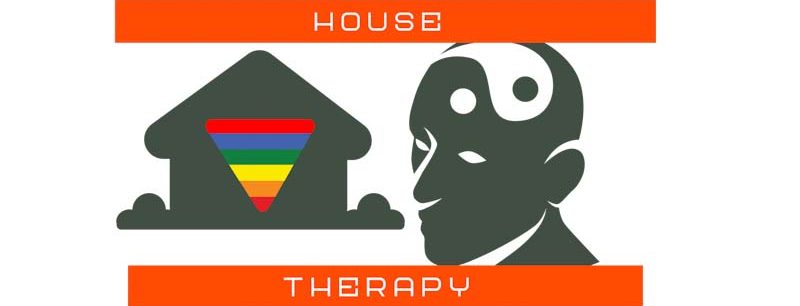Excerpt from House Therapy
We spend a great deal of our time doing things without any real reflection upon what we are doing. We are intrinsically caught up in the drama of everyday activity, and this often prevents us from pausing, and having a good look around at where we currently find ourselves. Which is why it is usually only at times of crisis that reassessments about our lives are made. In the meantime, we are often all at sea and lacking a crystal ball, or insight into our situation. It is not that the process involved in House Therapy is particularly acute but rather that we are culturally blind to any real analysis of our own behaviour. If it is not broken why bother fixing it, or even looking into it – this is our readily expressed cultural attitude to self-awareness in the west. This also explains why we are so sceptical about the different philosophical approaches that come out of the east. We are culturally averse to accepting viewpoints, like those that have emerged from Taoism, Zen, Buddhism, and other more reflective pathways through life. If we cannot immediately ‘join all the dots’ then we disparage it as unscientific. Really the truth and evidence of who and what we are is all around us, and right in front of us. You just need to take the time to have a look.
“Perception, it has recently been said, may be regarded as primarily the modification of an anticipation. It is always an active process, conditioned by our expectations and adapted to situations. Instead of talking of seeing and knowing, we might do a little better to talk of seeing and noticing. We notice only when we look for something, and we look when our attention is aroused by some disequilibrium, a difference between our expectation and the incoming message. We cannot take in all we see in a room, but we notice if something has changed.”
E M Gombrich, Art and Illusion, 1960.
We influence everything we come into contact with, in fact according to the latest research in physics – Quantum Theory – these things may or may not exist without our participation or observance. Science, in the most cutting-edge realms, now shows us that our very own consciousness plays a direct part in the existence of our universe – pretty awe-inspiring stuff really. We are no longer seen as mere spectators in the cosmos, but rather our very presence has an impact on all life and matter around us. It takes a long time for these massive changes in collective human consciousness to filter through to all of us, and the revolutionary illumination provided by Quantum Mechanics began about one hundred years ago. People like Albert Einstein, Werner Heisenberg and Niels Bohr made these theoretical discoveries about the nature of life on the sub-atomic plane at the beginning of the twentieth century, but they followed nearly three hundred years of classical or Newtonian physics. Basically, they discovered that the rules which govern the macro universe, the bigger things like apples and planets, did not apply to the smallest known particles, which make up the fabric of all matter. So, the rules of the known game had changed and for a long time nobody was very sure about a lot of things. They were clear about the fact that these sub-atomic particles, or waves, were affected by the those who were observing them; and that matter was no longer indifferent to our consciousness of it.
“Consciousness may be associated with all quantum mechanical processes… Since everything that occurs is ultimately the result of one or more quantum mechanical events, the universe is ‘inhabited’ by an almost unlimited number of rather discreet conscious, usually non-thinking entities that are responsible for the detailed working of the universe.” (8)
Physicist E.H. Walker
As human beings we experience life and matter through the filter of our five senses: touch; taste; smell; sound; and sight. Everything in existence must pass through these processing tools within our bodies and brains to register within our fields of perception. Light energy from the sun is processed via our senses – the eye and its visual optics fibres and the optic parts of the cerebral cortex – and we perceive a limited spectrum of what we call light. Is this the ultimate nature of this energy or simply what we can detect via our human sensory technology? Quantum physics is now taking us to that limit, and redefining that border, with what used to be called the known universe.
“Physical concepts are free creations of the human mind, uniquely determined by the external world. In our endeavour to understand reality we are somewhat like a man trying to understand the mechanism of a closed watch. He sees the face and the moving hands, even hears its ticking, but he has no way of opening the case. If he is ingenious, he may form some picture of a mechanism which could be responsible for all the things he observes, but he may never be quite sure his picture is the only one which could explain his observations. He will never be able to compare his picture with the real mechanism and he cannot even imagine the possibility of the meaning of such a comparison.”
Albert Einstein
